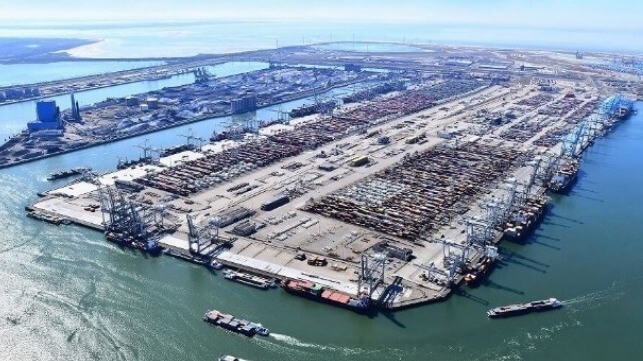NGO T&E Alleges Carriers Are "Profiteering" From EU Emissions Rules

The activist NGO Transport & Environment (T&E) issued a new study contending the major shipping carriers are “profiteering from the EU carbon emission charges,” introduced at the beginning of 2024. They are claiming the surcharges introduced by the carriers are more than the actual cost to the shipping companies from the new measures, while the major shipping companies cited in the report quickly responded saying the group’s study used inaccurate and incomplete data.
The EU became the first major region to impose fees on the shipping lines for their carbon emissions. The highly controversial action that caused a heated political debate was introduced this year and is being phased in over the next few years. Initially, the fee is being imposed on 40 percent of carbon emissions and steps up to 70 percent and then 100 percent in 2026.
Major carriers responded by introducing a surcharge fee for all shipments into the region. The carriers have said they would continue to access the fees and update them quarterly to reflect the actual prices charged by the EU and their experience with the costs of the ETS.
T&E however analyzed 565 voyages from 20 different ships from Europe’s four largest carriers, Maersk, MSC, CMA CMG, and Hapag-Lloyd. While the report recognizes that the expenses of each voyage fluctuate, T&E contends that in 90 percent of the voyages it analyzed the carriers are charging customers more than the actual cost of the EU ETS.
“Far from avoiding the ETS, shipping companies appear to be profiting from it,” alleges the report. They contend that Maersk is averaging a profit of as much as €60,000 per voyage while MSC realizes an average of €25,000, Hapag-Lloyd €23,000, and CMA CGM €14,000. They said that the individual profit may not be that high on a voyage while alleging on one trip Maersk was likely to make €325,000 extra from the fees.
Maersk responded saying the report is flawed and uses inaccurate and selective data. They called the methodology “flawed,” for the report while noting that the uses outdated surcharge estimates. The price of carbon has not been announced but T&E said in its footnotes that it used a “conservative estimate” based on an official carbon price of €90, which is higher than the current ETS price of €64.95.
“Economies of scale mean the shipping business can absorb pretty large price shocks. The Red Sea disruption is pretty much as bad as it gets and global trade still hasn’t ground to a halt. The ETS is peanuts in comparison,” said Jacob Armstrong in defense of the new policy. He concluded that “Cost is not a barrier to shipping decarbonization when the most ambitious green measures would add just cents to most consumer goods.”
Further, he seeks to dissuade the argument, especially of southern European ports, that shipments would be diverted to transshipment ports across the Mediterranean to avoid some of the fees. During the formulation of the ETS system, special consideration was taken into account to designate transshipment ports.
Armstrong responds, “Southern European governments are warning that the ETS will cost them business by ships evading their ports, but why would they if they’re making money from it?”
He also argues that shipping costs have a marginal impact on the final cost of goods. He contends that this permits the carriers to charge the surcharges without fear from customers.
T&E was a strong advocate for the EU ETS saying that the initiatives did not go far enough and needed to be faster while they argued that transportation overall is the slowest sector in decarbonization. In this report, T&E concludes that even the most ambitious climate measures would add just cents to most consumer goods.

that matters most
Get the latest maritime news delivered to your inbox daily.
The shipping industry recognizes that carbon fees are emerging and have called for a universal approach as opposed to piecemeal in individual jurisdictions. ABS Chairman and CEO Christopher Wiernicki, concluded after the IMO's MEPC meeting last week that a universal, global carbon tax on shipping is coming. The industry and major carriers are working to adapt to the new rules and incorporate them into their operations. Carriers are still working to incorporate the costs into their operations and have promised to review and adapt to the systems.
